Intro
Learn intestine blockage signs, symptoms, and treatments. Identify bowel obstruction causes, intestinal blockage types, and seek medical help for digestive issues like constipation, bloating, and abdominal pain.
The human digestive system is a complex and vital network of organs that work together to break down food, absorb nutrients, and eliminate waste. One of the most critical components of this system is the intestine, a long, thin tube that plays a central role in the digestion and absorption of nutrients. However, when the intestine becomes blocked, it can lead to severe and potentially life-threatening complications. Intestine blockage signs are essential to recognize, as prompt medical attention can significantly improve outcomes.
Intestinal blockages, also known as bowel obstructions, occur when the normal flow of food, fluids, and gas through the intestines is partially or completely blocked. This can happen in either the small intestine or the large intestine (colon), and the causes can vary widely. Some common causes of intestinal blockages include adhesions from previous surgeries, hernias, tumors, and certain types of food, such as seeds or pits, that can get stuck in the intestine. Recognizing the signs of an intestinal blockage is crucial, as the condition can lead to severe abdominal pain, vomiting, constipation, and even death if left untreated.
The importance of recognizing intestine blockage signs cannot be overstated. Early detection and treatment can significantly reduce the risk of complications and improve outcomes. Moreover, understanding the causes, symptoms, and treatment options for intestinal blockages can empower individuals to take control of their digestive health. By being aware of the signs and symptoms of intestinal blockages, individuals can seek medical attention promptly, reducing the risk of severe complications and improving their chances of a full recovery.
Causes of Intestinal Blockages
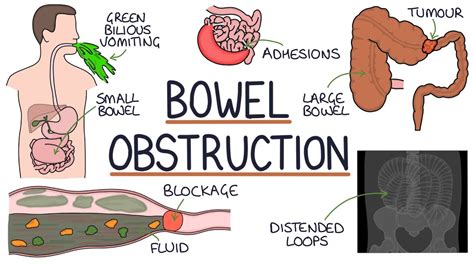
Types of Intestinal Blockages
There are several types of intestinal blockages, each with its own unique characteristics and causes. Partial blockages, for example, occur when the intestine is only partially blocked, allowing some food, fluids, and gas to pass through. Complete blockages, on the other hand, occur when the intestine is completely blocked, preventing any food, fluids, or gas from passing through. Some intestinal blockages can also be classified as simple or closed-loop obstructions. Simple obstructions occur when the intestine is blocked at a single point, while closed-loop obstructions occur when the intestine is blocked at two or more points, creating a loop of intestine that can become strangulated and cut off from blood supply.Symptoms of Intestinal Blockages
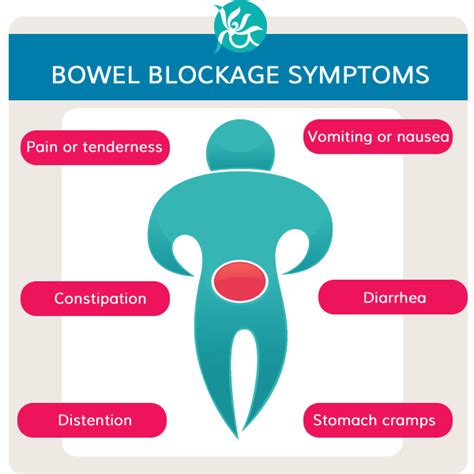
Diagnosing Intestinal Blockages
Diagnosing intestinal blockages typically involves a combination of physical examination, medical history, and diagnostic tests. A healthcare provider may perform a physical examination to check for abdominal tenderness, distension, and bowel sounds. They may also ask questions about the individual's medical history, including any previous surgeries, illnesses, or injuries. Diagnostic tests, such as X-rays, CT scans, and MRI scans, can help confirm the diagnosis and determine the location and severity of the blockage. In some cases, a healthcare provider may also perform an endoscopy or colonoscopy to visualize the inside of the intestine and check for any blockages or other abnormalities.Treatment Options for Intestinal Blockages
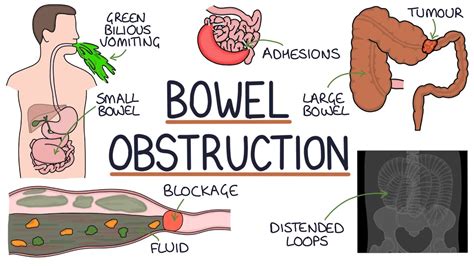
Preventing Intestinal Blockages
While some intestinal blockages may be unavoidable, there are steps that individuals can take to reduce their risk. Eating a high-fiber diet, staying hydrated, and exercising regularly can help promote regular bowel movements and reduce the risk of constipation. Avoiding foods that are high in fat and sugar, and eating smaller, more frequent meals can also help reduce the risk of intestinal blockages. Additionally, individuals who have had previous abdominal surgeries or have a family history of intestinal blockages should be aware of their increased risk and take steps to manage their symptoms and prevent complications.Complications of Intestinal Blockages
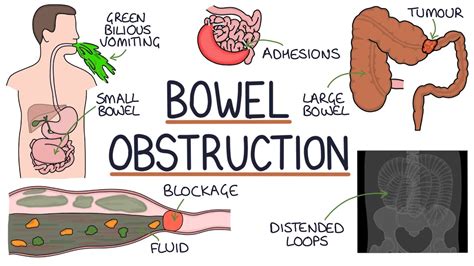
Managing Intestinal Blockage Symptoms
Managing intestinal blockage symptoms requires a comprehensive approach that includes medical treatment, lifestyle modifications, and dietary changes. Individuals who are experiencing symptoms of an intestinal blockage should seek medical attention promptly, as early treatment can significantly improve outcomes. In the meantime, there are several steps that individuals can take to manage their symptoms, including staying hydrated, eating a bland diet, and avoiding strenuous activities. Additionally, individuals who are experiencing severe abdominal pain, vomiting, or constipation should seek medical attention immediately, as these symptoms can be signs of a life-threatening complication.Intestinal Blockage Recovery
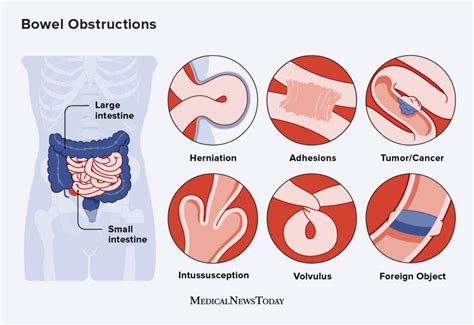
Intestinal Blockage Prognosis
The prognosis for individuals with an intestinal blockage depends on several factors, including the location and severity of the blockage, the individual's overall health, and the effectiveness of treatment. In general, individuals who receive prompt medical attention and undergo treatment for an intestinal blockage have a good prognosis, with most individuals making a full recovery. However, individuals who experience complications, such as perforation of the intestine or sepsis, may have a poorer prognosis and may require ongoing medical care to manage their symptoms and prevent future complications.What are the common causes of intestinal blockages?
+Intestinal blockages can be caused by a variety of factors, including adhesions from previous surgeries, hernias, tumors, and certain types of food, such as seeds or pits, that can get stuck in the intestine.
What are the symptoms of an intestinal blockage?
+The symptoms of an intestinal blockage can include severe abdominal pain, vomiting, constipation, and abdominal distension. In some cases, individuals may also experience nausea, diarrhea, or blood in the stool.
How are intestinal blockages diagnosed?
+Diagnosing intestinal blockages typically involves a combination of physical examination, medical history, and diagnostic tests, such as X-rays, CT scans, and MRI scans.
In conclusion, recognizing intestine blockage signs is crucial for prompt medical attention and improved outcomes. By understanding the causes, symptoms, and treatment options for intestinal blockages, individuals can take control of their digestive health and reduce their risk of complications. If you or someone you know is experiencing symptoms of an intestinal blockage, it is essential to seek medical attention promptly. With proper treatment and care, individuals can make a full recovery from an intestinal blockage and resume their normal activities. We encourage you to share this article with others, and to comment below with any questions or concerns you may have. By working together, we can promote digestive health and reduce the risk of intestinal blockages.
